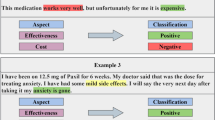Abstract
This paper aims to develop a novel hybrid feature learning approach for aspect-based sentiment analysis to detect and classify the widely available unlabeled social data. The proposed approach employs Bidirectional Encoder Representations from Transformers (BERT) technique with Latent Dirichlet Allocation (LDA) model to predict the context words and learn the corresponding sentence and document vectors. Also, the proposed approach utilizes Bi-directional Long Short-Term Memory (Bi-LSTM) to classify the extracted sentiment. Various experiments are conducted on several social media datasets about adverse drug reactions (ADRs) reviews as a case study to evaluate the effectiveness of the proposed approach. Obtained experimental results show that the proposed feature learning approach outperforms other tested state-of-the-art feature learning approaches and improves the feature and topic extraction for unstructured social media text and sentiment classification. The proposed approach achieved significant values of 95.4% for average accuracy, 0.935 for AUC score, and 94% for F-measure.
Access this chapter
Tax calculation will be finalised at checkout
Purchases are for personal use only
Similar content being viewed by others
References
Fang, X., Zhan, J.: Sentiment analysis using product review data. J. Big Data 2(1), 1–14 (2015). https://doi.org/10.1186/s40537-015-0015-2
Kharde, V.A., Sonawane, S.: Sentiment analysis of twitter data: a survey of techniques. Int. J. Comput. Appl. 975, 8887 (2016)
Gupta, S., Gupta, M., Varma, V., Pawar, S., Ramrakhiyani, N., Palshikar, G.K.: Co-training for extraction of adverse drug reaction mentions from tweets. In: Pasi, G., Piwowarski, B., Azzopardi, L., Hanbury, A. (eds.) Advances in Information Retrieval, ECIR 2018. Lecture Notes in Computer Science, vol. 10772. Springer, Cham (2018). https://doi.org/10.1007/978-3-319-76941-7_44
Ain, Q.T., et al.: Sentiment analysis using deep learning techniques: a review. Int. J. Adv. Comput. Sci. Appl. 8(6), 424 (2017)
Howard, J., Ruder, S.: Universal language model fine-tuning for text classification. In: Proceedings of the 56th Annual Meeting of the Association for Computational Linguistics, Melbourne, Australia, pp. 328–339 (2018)
Injadat, M., Salo, F., Nassif, A.B.: Data mining techniques in social media: a survey. Neurocomputing 214, 654–670 (2016)
Lauren, P., Qu, G., Zhang, F., Lendasse, A.: Discriminant document embeddings with an extreme learning machine for classifying clinical narratives. Neurocomputing 277, 129–138 (2018)
Fan, B., Fan, W., Smith, C., Garner, H.S.: Adverse drug event detection and extraction from open data: a deep learning approach. Inf. Process. Manage. 57(1), 102131 (2020)
He, B., Guan, Y., Dai, R.: Classifying medical relations in clinical text via convolutional neural networks. Artif. Intell. Med. 93, 43–49 (2019)
Liu, S., Lee, I.: Extracting features with medical sentiment lexicon and position encoding for drug reviews. Health Inf. Sci. Syst. 7(1), 1–10 (2019). https://doi.org/10.1007/s13755-019-0072-6
Cocos, A., Fiks, A.G., Masino, A.J.: Deep learning for pharmacovigilance: recurrent neural network architectures for labeling adverse drug reactions in Twitter posts. J. Am. Med. Inform. Assoc. 24(4), 813–821 (2017)
Dandala, B., Joopudi, V., Devarakonda, M.: Adverse drug events detection in clinical notes by jointly modeling entities and relations using neural networks. Drug Saf. 42(1), 135–146 (2019)
Jelodar, H., et al.: Latent dirichlet allocation (LDA) and topic modeling: models, applications, a survey. Multimedia Tools Appl. 78(11), 15169–15211 (2019)
Wang, Y., Huang, M., Zhu, X., Zhao, L.: Attention-based LSTM for aspect-level sentiment classification. In: Proceedings of the 2016 Conference on Empirical Methods in Natural Language Processing, Austin, Texas, USA, pp. 606–615. Association for Computational Linguistics (2016)
Author information
Authors and Affiliations
Corresponding author
Editor information
Editors and Affiliations
Rights and permissions
Copyright information
© 2022 The Author(s), under exclusive license to Springer Nature Switzerland AG
About this paper
Cite this paper
Sweidan, A.H., El-Bendary, N., Al-Feel, H. (2022). Aspect-Based Sentiment Analysis in Drug Reviews Based on Hybrid Feature Learning. In: Sanjurjo González, H., Pastor López, I., García Bringas, P., Quintián, H., Corchado, E. (eds) 16th International Conference on Soft Computing Models in Industrial and Environmental Applications (SOCO 2021). SOCO 2021. Advances in Intelligent Systems and Computing, vol 1401. Springer, Cham. https://doi.org/10.1007/978-3-030-87869-6_8
Download citation
DOI: https://doi.org/10.1007/978-3-030-87869-6_8
Published:
Publisher Name: Springer, Cham
Print ISBN: 978-3-030-87868-9
Online ISBN: 978-3-030-87869-6
eBook Packages: Intelligent Technologies and RoboticsIntelligent Technologies and Robotics (R0)




